- Home
- Scott Turow
Pleading Guilty Page 23
Pleading Guilty Read online
Page 23
'How is it?'
'Wanna check?'
'I'll remember you offered.' She stood there, small, buttoned up, brimming with a great jolly glimmer. It made me a little sad to think how often Brush had been here before, walking into the office and feeling the thrill of knowing that she had this secret something going, a recollection of the senses in this quarter reserved for the grimly logical and perpetually banal. Everybody else arrived thinking of contract clauses and case names, and she rode up the elevators realizing she was going to share the sort of rosy smile we shared now, ripe with the anticipation of pleasure, of things that ought not be spoken of with the door open to the hall.
'I called you last night,' I said.
‘I was here late. I called you, too, when I got home, but you weren't around.' 'Guess who I ran into?'
She actually dropped her laundry and clapped her hands when I mouthed Bert's name. 'He's alive?'
I motioned to close the door. 'Where is he?' she asked. 'What's he been up to?' I reminded her about what she said yesterday, about wanting to stay in the dark.
'Starting tomorrow,' she responded.
I told her just a bit - Bert running from bad guys.
'But what did he say about the money?'
'Not clear,' I said. 'Our negotiations didn't get very far.' I explained that we'd been interrupted by Detective Dimonte.
'It sounds like this guy's really after you,' she said.
I just made a sound. Boy, was that true.
'So when will you hear again from Bert?'
'I'm sitting by the phone.' I touched it, right next to me, the latest in technology, sleek and black, like something from Skylab. 'In the meantime, I'm going to Pico Luan tomorrow to nose around.'
'Tomorrow? Toots's hearing is on again Tuesday.'
'The Committee only gave me two weeks. I'll do a two-day turnaround. Back Monday night. We're ready on Toots, right?' I lifted the brown expandable folder to show her I'd been minding the file. I added, 'I'm taking Lena.'
'Who's Lena?'
'First-year. From the U.'
'The redhead? The cute one?'
'I'd say stylish.'
Brushy frowned. 'What do you need her for?'
'A prover.' A witness - someone who could testify, if need be, in court. 'This lawyer I want to see is supposed to be a little slippery.'
Brushy wagged a finger and let forth in a self-mocking singsong, 'Don't be forgetting who's your girl now, Malloy.'
'Brush, you flatter me.'
'Mmm-hmm,' she answered. I was not sure whether Brushy was feeling wise to the ways of humans in general or just me, but somehow we'd blown past airy humor; her expression was wizened by mistrust. This mood of few illusions reverberated between us, with its bluesy wave forms, and I felt a momentary commission to get to the point.
'Think you're ready to be a one-man woman, Brush?' It was as close as I could come to mentioning Krzysinski.
'I've always gone one at a time, Mack. It's just now and then the time's been short.' She smiled a bit, but I realized intuitively that she meant it. Every one-night stand was a piece of Cinderella inside her head, a part of her always hoping that this slipper was going to fit. People's fantasies, even when they're morbid or trite, are somehow touching; it's the vulnerability, I suppose, the fact that lives, like cardboard cartons, fold so reliably along certain lines.
'You know,' I said, 'if the gals break my heart again, I don't think anyone'll find the pieces.'
'Malloy, give me some credit, okay? I know you. I get it.' She looked to the door to be certain it was closed, then walked to the desk and removed her hat before she gave me a smooch. I was still not ready to be soothed.
'How old are you now, Brush?'
'Thirty-eight,' she said, then thought twice of it and looked at me fiercely. Jesus, this gal could be tough. She asked what difference that made, as if she didn't know. The riff of the independent person is, I don't need nobody. I used to hear the same thing from certain old coppers. But God never made a soul for whom that was completely true. I sort of felt sorry for Brushy. She didn't really take me as the hottest thing on the market and she couldn't misapprehend my reliability or my nature. She just thought I was the best she could get or, maybe, that she deserved. But we both knew I had certain virtues. I'd do what she told me; I needed her guidance. She was smarter than me. And she thrilled me through and through.
‘I was just thinking about you,' I said. 'Thinking what?'
'How it is,' I answered. 'You know. The bright fires of youth burning down. A body gets lonely.' 'Very literary.'
'The Irish.' I touched the inside of my wrist. 'Verse is in the blood.' 'You have a dislikable side, Mack.' 'So I've been told.'
'It doesn't give you the right to hold someone in contempt, just because you get their number. You're not such a mystery yourself, you know.'
‘I see.'
'You're a miserable wretch, in case you think anybody else hasn't noticed.'
I told her to ease up and got to my feet. I took her firmly by her full shoulders and gripped her to my chest, where she willingly lingered, a foot shorter.
'Lunch?' she asked.
'Recruiters,' I said.
She groaned sympathetically at the prospect of committee work. 'Tonight?' I asked.
'It's my parents' anniversary.' She brightened. 'You could come. Warm Italian family.' 'Uh-oh.'
‘I suppose you're right.' We looked at each other. 'Tuesday,' I said. 'Toots.'
'Toots.' From the door, she cast a gloomy eye as I stood by my desk. Maybe there is never really a chance to fully combine after adolescence. Maybe all those tribal types, the Indians and the Hebrews, had it right, marrying everyone off by the age of thirteen. After that it's hit-or-miss, the spirit singing out but forced to surmount the channels, the borders dug deep of what has become recognized, if not cherished, as the self.
'Open or closed?' she asked from the door.
I flicked my hand.
'I'm here,' I told her, 'either way.'
B. Checking My Points
In a bow to democracy and to help with the work, the Committee over the years has created more subcommittees than either House of Congress, each one empowered with dominance over some minor region of law firm life. We have subs on ethical questions, on staff employment, on computer usage, pro bono work, and paper recycling. In this regime, recruiting is regarded as a mixed bag. It wields genuine authority, hiring both summer clerks and the first-year lawyers who join G & G every fall following the bar exams, but the workload is substantial and can never be fully managed in the rush of the week. By longstanding agreement, we meet when we have to for Saturday lunch. At this time of year, when our activities lull, it's only once a month, and after reviewing a final list of summer hirings and calendared interviews for next fall, the five of us - Stephanie Plotzky, Henry Sommers, Madge Dorf, Blake Whitson, me - fell, as we generally do, into gossip.
'So what do you hear?' asked Stephanie. 'I saw Martin this morning. He just said, "Bloodier than ever." He looked beat and it was nine o'clock.' We were two blocks down from the Needle at Max Heimer's, a deli characterized by second-rate food and Third World hygiene. Stephanie had ventured this goody, leaning over the table, her round face, highly made up even on Saturday, close to the container of pickles, whose side was spattered with grime.
'The corporate guys are getting hit,' said Henry. 'The eighties are over.' He was a bankruptcy lawyer himself, on boom times. Madge, a deal person, didn't really agree, and we debated a little among ourselves, as if it made any difference.
The Committee members were over at Club Belvedere today, in one of the elegant conference rooms, licking their pencils and passing out points. Groundhog Day was Thursday. My partners reacted with the same anxieties all the good boys in grade school exhibited on Marking Day, when the nuns sent us home so they could fill in our report cards. I never worried. I knew what was coming - A's and boxes of corrective checkmarks in the sections reserved for deportme
nt.
But I was not as sure where I was headed this year at the firm. I thought my deal with the Committee when I agreed to go looking for Bert was no more pay cuts, but nobody'd actually said that. My four partners on Recruiting were up-and-comers and it was clear that Pagnucci had given each one the treatment - some soothing, some encouragement. They were all going to make more money next year. As for me, I could tell from the sidelong glances that each of them sensed, supposedly privately, that my share was going to be reduced again. It was never ax murder. Just a 5 percent cut every year. Still, I walked back to the building after lunch alone and brooding.
All right, I admit it - these decreases each year hurt my feelings. Money's the big scorecard in this kind of life; there's no winning percentage, no runs batted in. It's always struck me as meaningful how we refer to the percentage of firm income we each are awarded as 'points.' Your partners tell you each year what they think you are worth.
By now I can live without everything the marginal dollar buys, except self-esteem.
I sat in my office. The cold winter sun could be seen through the screen of clouds; its light played on the river, tossing Christmas spangles across the greenish reflections of the big buildings on the banks. I tried to set aside my feelings of deprivation to think about Bert, but I got nowhere with that. How much? I kept thinking. How much were they taking away this year? What an effing load of nerve. I'm running from coppers and they're cutting my pay. I kept this up until I was seething. I was in one of my states, angry and mean, Bess Malloy's boy reeling from what he was missing. I drifted upstairs, not really telling myself where I was going, then looked both ways down the book-lined hall and slipped into Martin's office, figuring he'd have retained a draft of the proposed point scheme somewhere in his drawer where I'd peeked at it three years before. I wasn't worried at that moment about being caught. Let somebody catch me. Fucking let them. I had a few things to say. Eighteen years, for Chrissake. And they're paying Pagnucci on my back.
The most important papers in Martin's office were locked in his credenza behind the thousand-year oak. I'd seen him open the drawer a hundred times before, lifting the rubber belly on his hula dancer clock to reveal the battery and the little gold key. I had the usual drilling sense of isolation when I was alone in the firm and screwing around. The big corner office with its reliquary of goofball objects - the paintings, the sculptures, the weird furniture - was dim and I hesitated to turn on the light. What the hell would I accomplish? I wondered. Would I shit in the drawer, like some badass burglar expressing himself? Could I complain? I might. There were a lot of people around here who lay on the floor and moaned as GH Day approached, or went office to office sniping. It didn't matter, though, really. I was being bad. I felt just like a kid, but I'd felt like that before and there was some peculiar purification in acting on impulse.
Martin's private drawer is a mess. I was shocked to discover that the last time I did this. I would have expected exacting order. Martin is one of those persons, so large and voluble, so much a presence, that it is always disquieting to realize how much of his soul he conceals. I suppose Martin did the filing himself, given the utter sensitivity of the documents, and chaos reigned without a secretary's assistance. There were hanging folders in the drawer but many of the papers had been slopped un-stacked on the unfinished slats of the bottom. A lot of the most intimate secrets of the firm were in here. Letters from a shrink saying that one of our first-years would slit his throat if we fired him. (We hadn't.) Financial projections for the end of the year, which looked pretty bad. There was also a file with written evaluations of the performance of each partner. I was tempted to read through the disdainful comments about me, but decided to pass on the chance for more self-laceration. Finally I found a folder marked 'Points.'
Inside was a photocopy of an early draft, handwritten by Carl Pagnucci, of this year's point distribution plan. I didn't look at it closely, because in the same file I found a memo. It had been folded in four, but the handwritten initialing at the top could not be mistaken. J.A.K.E. John Andrew Kenneth Eiger. Jake loved his initials. They were on everything, his shirt cuff, his beer mugs, his golf bag. Like anything else in his hand, I could imitate the initials so well that I didn't even need a subscript to show I was signing with his authority, but nobody else around here was quite as skillful. I had no doubt this was authentic.
PLEADING GUILTY
PRIVILEGED AND CONFIDENTIAL
18 November
TO: Robert Kamin, Gage & Griswell FROM: John A. K. Eiger, General Counsel,
TransNational Air
RE: First Wave 397 Settlements
I wanted to advise you of a flap concerning the 397 settlement payments which arose while you were trying the Grainger claim. As usual, the plaintiffs' lawyers are fighting with each other about litigation expenses. It seems that Peter Neucriss engaged a firm in Cambridge, Mass., called Litiplex for litigation support -apparently they provided crash reconstruction, computer modeling, consulting engineers, expert testimony, analysis of the NTSB proceedings, and records management. Litiplex has a series of invoices outstanding totaling about $5.6 million. Neucriss says he hired them with the consent of all lead counsel for the class and says I agreed at the time of the settlement that Litiplex would be paid from the 397 fund. The class lawyers say there was no such agreement - not too surprising, since paying Litiplex off the top, as Neucriss is demanding, will reduce the class lawyers' fee by about half a million dollars. Both sides are threatening to take up the issue with Judge Bromwich. I am very much afraid that Bromwich will ask for an accounting, which will lead to discovery of the fund surplus. Rather than take that risk, and accepting that I may have made a commitment to Neucriss, I'll authorize payment of Litiplex's invoices as a below-the-line charge against the surplus. Please deliver the following checks to me.
Attached was a listing of Litiplex invoice numbers and the amounts supposedly due.
I no longer had to look for what Bert had transmitted to Glyndora. 'Per the attached, re agreement with Peter Neucriss ...' This, clearly, was it. But I read the memo three or four more times as I sat there in Martin's empty office, feeling as if somebody had put a cold hand on my heart. I kept asking myself the same thing, the voice within speaking in the forlorn tones of a child. What was I going to do now?
XX. MEMBERS OE THE CLUB
The Club Belvedere is Kindle County's oldest social club, erected in the Gilded Age. Here the true elite of the county, men of commerce and standing, have dined and played squash with each other for more than a century. Not your usual grubby politicians whose power is transient and, worse yet, borrowed, but people with fortunes, the owners of banks and industrial concerns, families whose names you see on old buildings, who will still be prominent here in three generations and whose children are apt to marry one another. These are folks who, generally speaking, like the world as it is, and virtually every achievement in social progress which I can recall has involved a celebrated fracas among the club membership, some of whom have inalterably opposed the admission of first Catholics, then Jews, blacks, women, and even a single Armenian. You would think that a sensible human would find this atmosphere repulsive, but the cachet the Belvedere confers seems to overwhelm almost every scruple, and Martin Gold, for instance, in relaxed conversation spoke of nothing but 'the club' for a solid month - how good the food was, how handsome the locker rooms - when he was elected to membership over a decade ago.
The club is an eight-story structure in Revival style that occupies half a block in Center City, not far from the Needle. I dashed over there, Jake's memo in my pocket, and swept in past the doorman. The facility is splendid. The entire first floor is paneled in American walnut, handsomely burnished to a deep tone which seems to embed the glow of low lights and reminds me inevitably of the brownskinned men who chopped these trees, and their descendants in livery who've kept the wood polished to a sheen like somebody's shoes. An imposing dual staircase of white marble rises at the far end
of the lobby, adorned with the club crest and winged cherubs, emblems of the period when Americans felt their surviving republic was destined again to achieve the greatness of Greece.
Naturally, I was not even in the lobby long enough to check my topcoat when here, goddamn it, was Wash. He was carrying, of all things, a golf club, a wood, gripping it like a dead goose by the neck, right below its lustrous persimmon head. I could not imagine what he was doing. It was in the twenties outside and the ground was frozen hard. He was equally surprised to see me, and met my appearance with a member's vaguely scornful air for a known outsider. He was wearing a smashing houndstooth sport jacket, checks of black and autumnal gold, and gleaming tasseled loafers. Squashed down below the neck of his open button-down shirt so that it was partly concealed, as if even Wash recognized that this was a ludicrous affectation, an ascot peeked out, spotted with itsy-bitsy paisleys. I had no idea what I was going to say when he greeted me, but I was saved by instinct.
'Meeting over?' I asked. Wash is far too cowardly to want to discuss with me the Committee's decisions about points, especially mine. That job fell every year to Martin, who, after the formalities of Groundhog Day, would honor me by a visit to my office and clap me on the back, creating the impression that he, at least, maintained firm opinions about my value. Instead, Wash's face weakened at once into a sappy ingratiating expression. Up close you can see a certain studied nature to Wash's amiable mannerisms. Pressed, he has no instincts of his own. He is a collection of everybody else's gestures, the ones he sees as appealing, winning, sure not to offend.

 Testimony
Testimony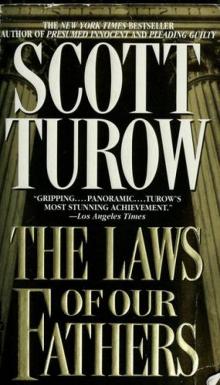 The Laws of Our Fathers
The Laws of Our Fathers Ordinary Heroes
Ordinary Heroes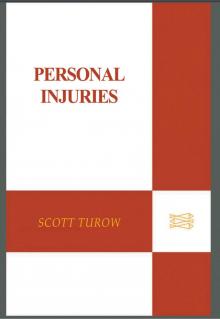 Personal Injuries
Personal Injuries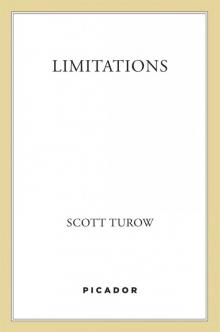 Limitations
Limitations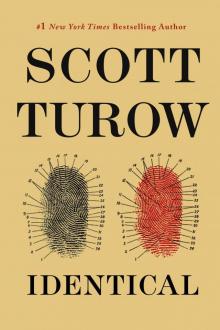 Identical
Identical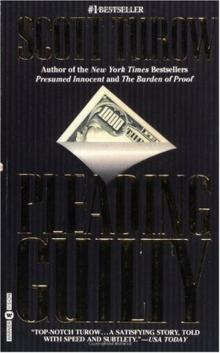 Pleading Guilty
Pleading Guilty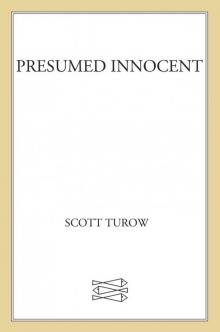 Presumed Innocent
Presumed Innocent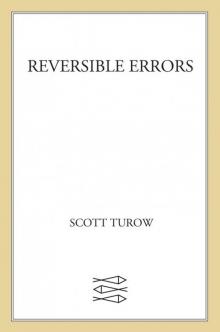 Reversible Errors
Reversible Errors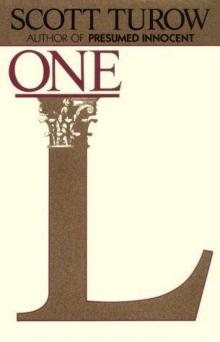 One L: The Turbulent True Story of a First Year at Harvard Law School
One L: The Turbulent True Story of a First Year at Harvard Law School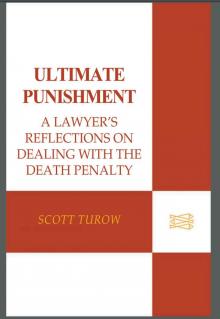 Ultimate Punishment
Ultimate Punishment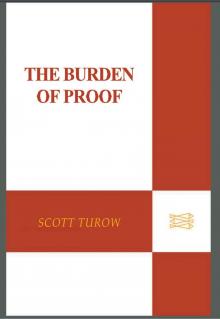 The Burden of Proof
The Burden of Proof Ordinary Heroes (2005)
Ordinary Heroes (2005)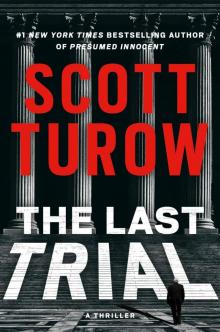 The Last Trial
The Last Trial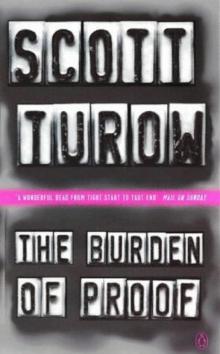 The Burden of Proof kc-2
The Burden of Proof kc-2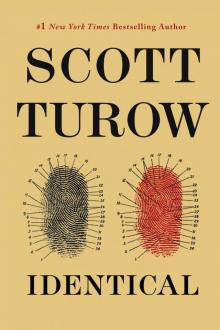 KC09 - Identical
KC09 - Identical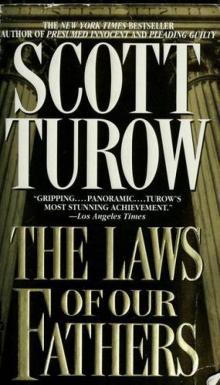 The Laws of our Fathers kc-4
The Laws of our Fathers kc-4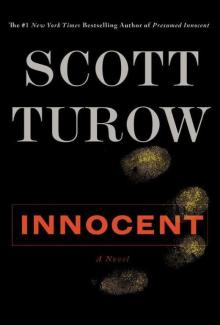 Innocent kc-8
Innocent kc-8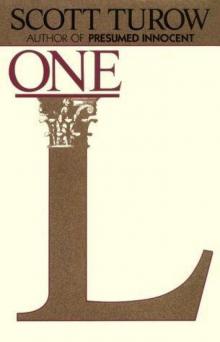 One L
One L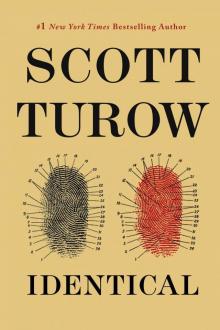 Identical kc-9
Identical kc-9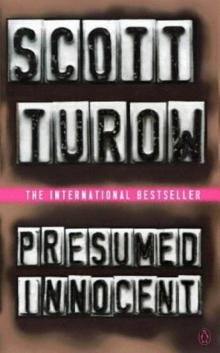 Presumed innocent kc-1
Presumed innocent kc-1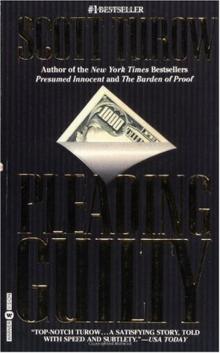 Pleading Guilty kc-3
Pleading Guilty kc-3 One L (1977)
One L (1977)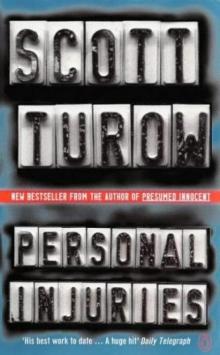 Personal injuries kc-5
Personal injuries kc-5